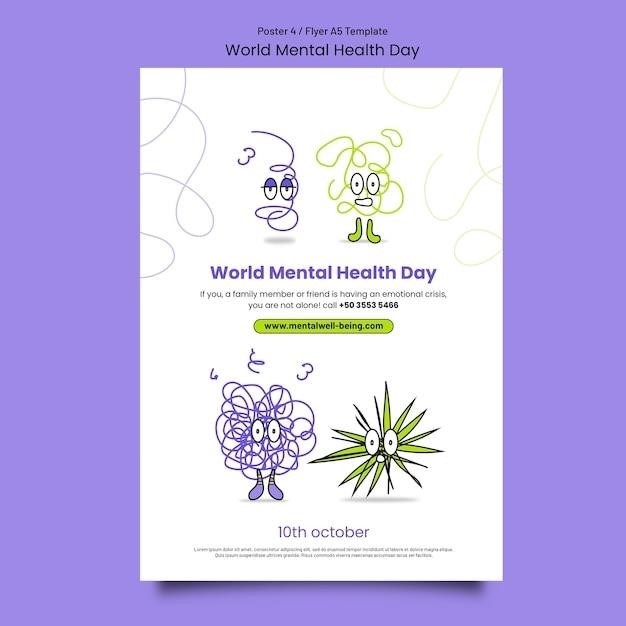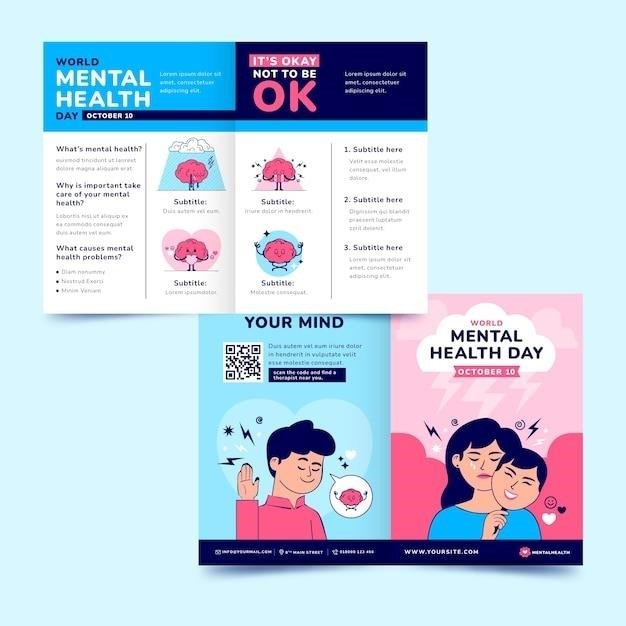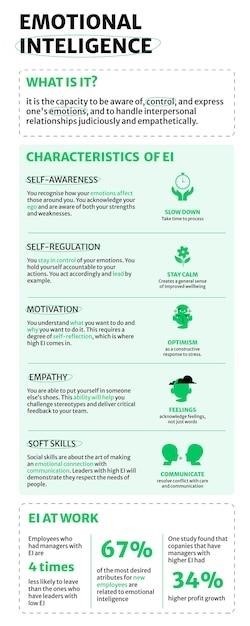
Understanding Emotional Intelligence Tests (EQ Tests)
Emotional intelligence (EQ) tests assess an individual’s ability to understand‚ manage‚ and utilize emotions effectively․ These assessments often measure self-awareness‚ self-management‚ social awareness‚ and relationship management‚ drawing upon models like Goleman’s and the Mayer-Salovey-Caruso model․ Various tests‚ including the MSCEIT‚ utilize different approaches to evaluating these crucial emotional competencies‚ providing valuable insights into emotional intelligence levels․
What are Emotional Intelligence Tests?
Emotional intelligence (EQ) tests are designed to measure an individual’s capacity to understand and manage their own emotions‚ as well as recognize and influence the emotions of others․ Unlike traditional IQ tests that focus on cognitive abilities‚ EQ tests delve into the emotional realm‚ assessing various aspects of emotional intelligence․ These assessments often incorporate self-report questionnaires‚ where individuals rate their own emotional tendencies and behaviors‚ providing subjective insights into their emotional intelligence․ Some tests also include performance-based tasks that require individuals to identify or respond to emotional cues presented through images‚ scenarios‚ or verbal descriptions․ The results of these tests can offer valuable self-awareness and guide personal development strategies․ Many online resources offer free or paid EQ tests‚ but it’s crucial to evaluate the reliability and validity of these assessments before relying on their results for significant decisions․
Types of Emotional Intelligence Tests⁚ A Comparative Overview
Emotional intelligence tests employ diverse methodologies‚ leading to a variety of assessment types․ Self-report questionnaires‚ like many readily available online tests‚ rely on individuals’ self-assessments of their emotional skills and tendencies․ These are often convenient and accessible but can be susceptible to bias․ In contrast‚ ability-based tests‚ such as the Mayer-Salovey-Caruso Emotional Intelligence Test (MSCEIT)‚ present scenarios or tasks requiring specific emotional reasoning abilities․ This approach aims for more objective measurement‚ focusing on demonstrable skills rather than self-perception․ Mixed-methods tests combine elements of both self-report and ability-based assessments‚ aiming to provide a more comprehensive evaluation․ Each type offers unique strengths and weaknesses; the best choice depends on the specific purpose and desired level of objectivity․ The selection should consider factors like the test’s reliability‚ validity‚ and alignment with the user’s needs․
Popular Emotional Intelligence Tests⁚ MSCEIT‚ Goleman’s Model‚ and Others
The Mayer-Salovey-Caruso Emotional Intelligence Test (MSCEIT) stands out as a prominent ability-based assessment․ It directly measures emotional abilities through performance-based tasks․ In contrast‚ assessments based on Goleman’s model often employ self-report questionnaires‚ focusing on traits associated with emotional intelligence․ These questionnaires typically assess aspects like self-awareness‚ self-regulation‚ motivation‚ empathy‚ and social skills․ While widely used‚ their reliance on self-reporting introduces potential biases․ Other notable tests include the Bar-On Emotional Quotient Inventory (EQ-i)‚ which adopts a mixed-methods approach‚ blending self-report and performance-based elements․ The choice of test depends heavily on the specific application and the desired balance between objective measurement of abilities and subjective assessment of self-perceived emotional competencies․ Each test offers a unique perspective on understanding and quantifying emotional intelligence․

Accessing Emotional Intelligence Test PDFs
Finding free emotional intelligence tests online requires careful evaluation of their reliability and validity․ Paid assessments from professionals offer greater assurance of accuracy‚ but free resources may provide a basic understanding․
Where to Find Free Emotional Intelligence Tests Online
Numerous websites offer free emotional intelligence (EQ) tests‚ but proceed with caution․ Many lack the rigorous scientific backing of established assessments like the Mayer-Salovey-Caruso Emotional Intelligence Test (MSCEIT)․ While some free online tests might provide a general sense of your emotional intelligence strengths and weaknesses‚ their accuracy and reliability are questionable․ Look for tests that clearly state their methodology and validation process․ Beware of tests that promise overly simplistic or immediate results‚ as genuine EQ assessment requires a more nuanced approach․ Consider the source⁚ reputable psychology websites or academic institutions are more likely to offer reliable‚ albeit possibly not free‚ tools․ Free tests often serve as marketing tools‚ aiming to attract users to paid services or other products․ Therefore‚ critically evaluate the information provided and temper your expectations regarding the accuracy of any free online EQ test․ Remember‚ a comprehensive understanding of your emotional intelligence may benefit from professional assessment․
Evaluating the Reliability and Validity of Online EQ Tests
The reliability and validity of online EQ tests vary significantly․ Unlike established tests like the MSCEIT‚ many free online assessments lack the rigorous psychometric testing necessary to ensure accurate and consistent results․ Look for information on the test’s development‚ including details about its sample size‚ statistical analysis‚ and validation studies․ A reliable test produces consistent scores over time‚ while a valid test measures what it claims to measure – in this case‚ emotional intelligence․ Free online tests often lack transparency in these areas‚ making it difficult to determine their accuracy․ Consider the test’s length; shorter tests may lack the depth needed for a thorough assessment․ The presence of established psychometric properties‚ such as Cronbach’s alpha (for internal consistency) and factor analysis results (for construct validity)‚ should be clearly reported․ The absence of such information casts doubt on the test’s credibility․ Ultimately‚ relying on free online tests for critical decisions related to personal development or professional contexts should be approached with extreme caution․
Accessing Paid or Professional Emotional Intelligence Assessments
For a more reliable and in-depth assessment of emotional intelligence‚ consider accessing paid or professional assessments․ These tests‚ often administered by trained professionals‚ typically undergo rigorous psychometric testing‚ ensuring higher reliability and validity compared to free online options․ Reputable providers will clearly state the test’s psychometric properties‚ including reliability coefficients and validity evidence‚ giving you confidence in the results․ Professional assessments often include a detailed interpretation of the scores‚ providing insights into your strengths and weaknesses․ This personalized feedback can be invaluable for personal growth and professional development․ Paid assessments may also offer follow-up support‚ such as coaching or workshops‚ to help you improve your emotional intelligence․ While the cost can be a barrier‚ the investment in a professionally administered and validated assessment can yield significant benefits in terms of accuracy and actionable insights․ Remember to research providers carefully‚ choosing those with established credentials and a proven track record․

Interpreting Your Results and Improving Emotional Intelligence
Understanding your EQ scores reveals areas for growth․ Identify weaknesses and leverage strengths․ Practical steps‚ such as mindfulness and active listening‚ enhance EQ․ Numerous resources‚ including books and workshops‚ support further development․
Understanding Your EQ Scores⁚ Strengths and Weaknesses
EQ test results offer a multifaceted view of your emotional intelligence‚ highlighting both strengths and areas needing improvement․ A high score in self-awareness might indicate strong introspection and self-understanding‚ allowing you to readily recognize and manage your emotions effectively․ Conversely‚ a lower score might suggest a need for increased self-reflection and mindfulness practices to better understand your emotional responses․ Similarly‚ high scores in self-regulation often reflect excellent control over impulses and emotional reactivity‚ enabling calm responses under pressure․ However‚ a lower score might indicate the need for strategies to manage stress and improve emotional regulation‚ perhaps through techniques such as deep breathing exercises or cognitive reframing․
Social awareness‚ encompassing empathy and understanding others’ emotions‚ is crucial for effective communication and collaboration․ High scores often translate into strong interpersonal skills and the ability to build rapport․ Areas for development might include active listening skills and perspective-taking exercises to enhance emotional understanding of others․ Finally‚ relationship management – the capacity to influence‚ inspire‚ and build strong relationships – is essential for leadership and teamwork․ High scores suggest skill in conflict resolution and building consensus‚ while lower scores might necessitate improving communication and negotiation skills to foster healthier relationships․
Practical Steps to Improve Your Emotional Intelligence
Improving emotional intelligence is a journey of self-discovery and skill development․ Begin by practicing mindfulness – paying close attention to your thoughts and feelings without judgment․ Regular meditation or mindful breathing exercises can enhance self-awareness‚ allowing you to recognize emotional triggers and responses more effectively․ Next‚ cultivate self-compassion; treat yourself with the same kindness and understanding you would offer a friend․ This reduces self-criticism and fosters emotional resilience․ To boost self-regulation‚ experiment with stress management techniques like deep breathing‚ progressive muscle relaxation‚ or yoga․ These techniques help manage overwhelming emotions and improve impulse control․ Enhance social awareness by actively listening to others‚ seeking to understand their perspectives‚ and practicing empathy․ Engage in conversations with diverse individuals‚ exploring different viewpoints to broaden your understanding of human emotions․ Finally‚ improve relationship management by focusing on clear and assertive communication․ Practice expressing your needs respectfully while actively listening to others․ Develop conflict-resolution skills through negotiation and compromise‚ and actively build strong‚ positive relationships․ Consistent effort in these areas significantly enhances your emotional intelligence․
Resources for Further Development and Learning
Numerous resources are available to further develop your emotional intelligence․ Books such as “Emotional Intelligence 2․0” by Travis Bradberry and Jean Greaves offer practical strategies and exercises․ Online courses on platforms like Coursera and edX provide structured learning experiences‚ often incorporating interactive exercises and assessments․ Consider seeking out workshops or seminars focused on specific aspects of emotional intelligence‚ such as communication skills or conflict resolution․ These interactive settings allow for practical application of learned concepts and peer learning opportunities․ Many reputable websites offer free articles‚ blog posts‚ and self-assessment tools to gauge your progress and identify areas for improvement․ Podcasts dedicated to emotional intelligence provide accessible insights and expert advice‚ allowing for convenient learning during commutes or downtime․ Remember that continuous learning and self-reflection are crucial․ Regularly revisit your strengths and weaknesses‚ adjusting your learning plan accordingly to maintain a holistic approach to emotional intelligence development․ Your journey towards enhanced emotional intelligence is an ongoing process of growth and refinement․